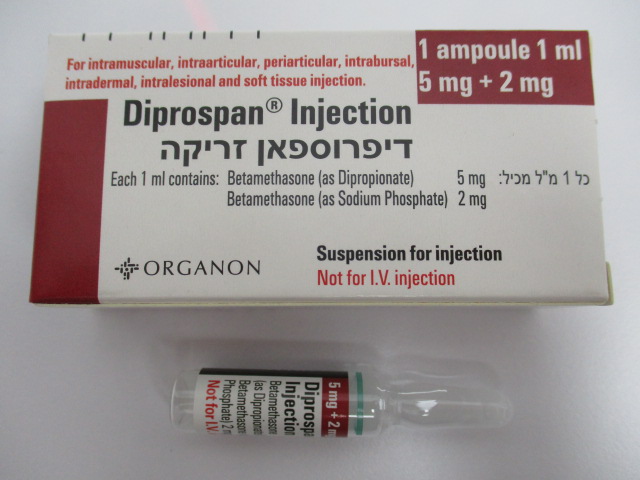Quest for the right Drug

דיפרוספאן זריקה DIPROSPAN INJECTION (BETAMETHASONE AS DIPROPIONATE, BETAMETHASONE SODIUM PHOSPHATE)
תרופה במרשם
תרופה בסל
נרקוטיקה
ציטוטוקסיקה
צורת מתן:
תוך-שרירי, תוך-עורי, תוך מפרקי, לתוך נוזל העצם, זריקה ליד המפרק, , : I.M, INTRADERMAL, INTRA-ARTICULAR, INTRABURSAL, PERIARTICULAR, SOFT TISSUE INJECTION, INTRALESIONAL
צורת מינון:
תרחיף להזרקה : SUSPENSION FOR INJECTION
עלון לרופא
מינוניםPosology התוויות
Indications תופעות לוואי
Adverse reactions התוויות נגד
Contraindications אינטראקציות
Interactions מינון יתר
Overdose הריון/הנקה
Pregnancy & Lactation אוכלוסיות מיוחדות
Special populations תכונות פרמקולוגיות
Pharmacological properties מידע רוקחי
Pharmaceutical particulars אזהרת שימוש
Special Warning עלון לרופא
Physicians Leaflet
Interactions : אינטראקציות
4.5 Interaction with other medicinal products and other forms of interaction Interaction with other medicinal products: Combination with phenobarbital, rifampin, phenytoin or ephedrine may enhance the metabolism of corticosteroids, resulting in a decrease in therapeutic effect. PATIENTS ON CORTICOTHERAPY CANNOT RECEIVE THE FOLLOWING TYPES OF TREATMENT: - SMALLPOX VACCINATION. - OTHER METHODS OF IMMUNIZATION (ESPECIALLY AT HIGH DOSE) BECAUSE OF THE RISK OF NEUROLOGICAL COMPLICATIONS AND INADEQUATE ANTIBODY RESPONSE. However, patients receiving corticosteroids as replacement therapy may be immunized (e.g., Addison's disease). The combination with diuretics such as thiazides may increase the risk of glucose intolerance. Patients simultaneously receiving a corticosteroid and an estrogen must be monitored for excessive corticosteroid effects. The simultaneous administration of corticosteroids and cardiac glycosides may increase the risk of arrhythmias or digitalis toxicity related to hypokalemia. Often, patients using cardiac glycosides also take diuretics which induce potassium depletion; in this case, it is essential to conduct potassium level determinations. Corticosteroids may worsen the potassium depletion caused by amphotericin B. In all patients taking one of these medication combinations, serum electrolytes, particularly serum potassium, should be closely monitored. The simultaneous use of corticosteroids and coumarin-type anticoagulants may increase or decrease the anticoagulant effects, which may require a dosage adjustment. In patients taking anticoagulants in combination with glucocorticoids, the possibility of gastrointestinal ulceration induced by corticosteroids, or increased risk of internal bleeding, must be considered. Corticosteroids may decrease the concentration of salicylates in the blood. When lowering the dose of corticosteroids or discontinuing treatment, patients should be checked for the presence of salicylism. The combination of glucocorticoids with salicylates may increase the frequency and severity of a gastrointestinal ulcer. The combination with non-steroidal anti-inflammatories or alcohol can lead to an increased risk of developing a gastrointestinal ulcer or the worsening of an existing ulcer. In diabetics, it is sometimes necessary to adjust the dose of oral antidiabetic agents or insulin, given the intrinsic hyperglycemic effect of glucocorticoids. Combination with somatropin may inhibit the response to this hormone. Betamethasone doses greater than 300-450 µg (0.3 to 0.45 mg) per m2 of body surface area per day should be avoided during administration of somatotropin. Co-treatment with CYP3A inhibitors, including cobicistat-containing products, is expected to increase the risk of systemic side-effects. The combination should be avoided unless the benefit outweighs the increased risk of systemic corticosteroid side-effects, in which case patients should be monitored for systemic corticosteroid side-effects. Other forms of interactions: Laboratory tests Corticosteroids may influence the nitro blue tetrazolium reduction test and produce false negative results. When the patient is treated with corticosteroids, this fact should be taken into account when interpreting the parameters and laboratory tests (skin tests, thyroid hormone levels, etc.).

שימוש לפי פנקס קופ''ח כללית 1994
Rheumatoid arthritis, osteoarthritis, other arthritic conditions by intra-articular injection, inflammatory, allergic & rheumatic conditions requiring a glucocorticoid effect, in patients for whom treatment with oral corticosteroid is not feasible. יירשם ע"י רופא אורטופד, מומחה למחלות ריאה ומומחה לרפואה פנימית
תאריך הכללה מקורי בסל
01/01/1995
הגבלות
תרופה מוגבלת לרישום ע'י רופא מומחה או הגבלה אחרת
מידע נוסף
